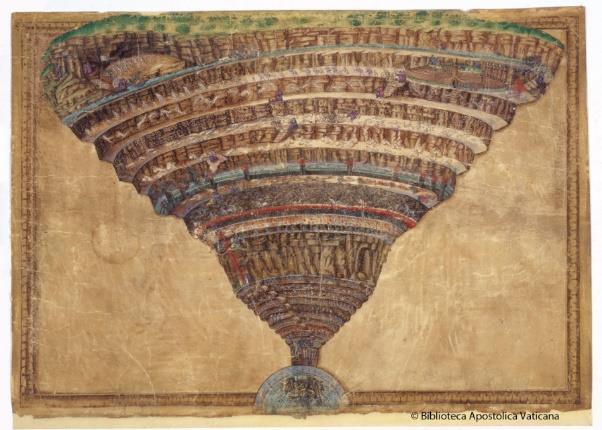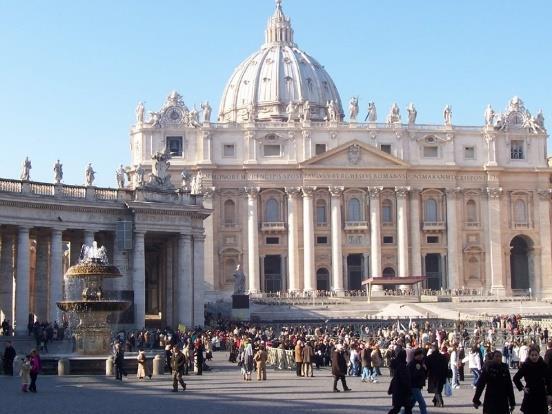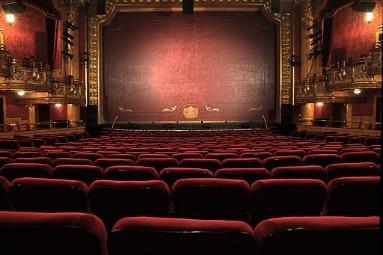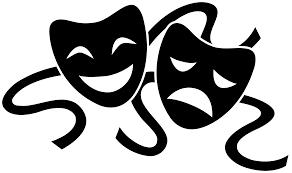
7 minute read
P
L’Impatto Culturale Di Divina Commedia
La illustrazione di Botticelli inspirato di 'Divina Commedia' La Basilica di San Pietro nella Città della Vaticana
Advertisement

Tradotto in quasi 300 lingue, La Divina Commedia di Dante sta spesso proclamando uno dei più influenti testi letterari del mondo. Entro l’anno 1400, non meno di 12 commentari era scritto sul poema e Dante è diventato noto come la divina poeta. Yeats, un poeta irlandese, l’ha chiamato “la principale immaginazione del mondo cristiano” e T S Eliot, un americano-inglese poeta, ha confrontato la preminenza di Dante da quello di William Shakespeare. La Divina Commedia non solo diventa inspirazione per scrittori attraverso secoli, ma anche ha influenzato pintori da Botticelli a Dalì; scultori come Rodin – su famoso Kiss era basato sulle amanti eternamente dannato di Dante, Pablo e Francesca; compositori come Tchaikovsky chi ha tratto simile ispirazione per su fantasia orchestrale Francesca da Rimini; e persino era illustrato nei fumetti di X-Men.
Dante ha scritto originariamente nel Fiorentino Tuscano invece di latino, la lingua di tutte opera letterarie serie in Italia quell’epoca. Tuttavia, tanti italiani alfabetizzati si hanno sforzato di imparare il dialetto Tuscano in modo da riconoscere la opera nella sua forma originale, rendendolo la lingua franca di Italia e infine è diventato conosciute come unicamente ‘Italiano’. Facendo una lista delle peccate e traendo le dovute conclusioni della Bibbia, Dante ha aiutando gettare la basi per una rivoluzione intellettuale, compreso il Rinascimento o l’Illuminismo. Per di più, l’uso di Virgilio, una figura letterario che Dante le guardava con ammirazione, e Beatrice, la sua donna ideale, come guide mostrano le sue faziosità. Questi pregiudizi formano un gran porzione del nostro punto di vista di Paradiso, Inferno e Purgatorio. Ha combinato la mitologia greco-romano con la teologia cristiano e ha utilizzato questi referenti come i testimoni retorichi per commentare sui problemi politichi o religiosi ai suoi tempi. Ha condannato con energia la Chiesa Cattolica ed è fra i primi di attaccare così tanti aspetti, incluso la vendita di appagamenti, nei suoi testi letterari.
The Cultural Impact of The Divine Comedy
Translated into almost 300 languages, Dante’s Divine Comedy has often been heralded as one of the world’s most influential literary texts. By the year 1400, no fewer than 12 commentaries had been written on the poem and he became known as the ‘divina poeta’ or the divine poet. Yeats, an Irish poet, called him “the chief imagination of Christendom” and T S Eliot compared his pre-eminence to that of William Shakespeare. Not only did it become inspiration for writers across the centuries, but it also influenced painters from Botticelli to Dalí; sculptors such as Rodin – whose famous Kiss was based on Dante’s eternally damned lovers, Pablo and Francesca; composers such as Tchaikovsky and his orchestral fantasia Francesca da Rimini; and was even illustrated in the comics of X-Men. Dante originally wrote in Florentine Tuscan instead of Latin, which was the language of all serious literary works in Italy at the time. However, many literate Italians strove to learn the Tuscan dialect in order to appreciate the work in its original form, making it the lingua franca of Italy and eventually it became known as solely ‘Italian’. By cataloguing sins and filling in the blanks of the Bible, Dante helped set the stage for intellectual revolution, including the Renaissance or the Enlightenment. Furthermore, the use of Virgil, a literary figure he himself looked up to, and Beatrice, his ideal woman, as guides demonstrates his biases which inform much of our view of Hell, Purgatory and Heaven. He combined Greek/Roman myth with Christian theology and used these references as rhetorical testimonies to comment on the political or religious issues of his day. He powerfully condemned the Roman Catholic Church and is one of the first to attack so many aspects, including the sale of indulgences, in his literary work.
Die Schwierigkeiten bei der Übersetzung von Werken der Musiktheater
Es ist immer schwierig, etwas zu übersetzen, weil jede Sprache seine eigenen Eigenarten, die es einzigartig macht, hat. Zum Beispiel, obwohl Deutsch und English zu der gleichen Sprachfamilie gehören, haben sie ganz andere Wortstellung. Eine Übersetzung ein Werk der Musiktheater deshalb muss viele Faktoren berücksichtigen, um genau zu sein. Natürlich muss ein Übersetzer über die tatsächlichen Worte überlegen – jedoch steckt da mehr dahinter. Theater und Musiktheater sind häufig entworfen, um die Gesellschaft zu widerspiegeln – also muss eine genaue Übersetzung die Kultur sowohl der Ausgangssprache also auch der Zielsprache widerspiegeln, weil es Auswirkungen auf dem Empfang und dem Verständnis wird. Häufig hat eine wörtliche Übersetzung ein unterschiedliches Gewicht für der Zuschauer aufgrund von inhärenten Unterschieden zwischen Kultur. Vielleicht kann es durch Kleinigkeiten anderen behoben werden, zum Beispiel die Essen, die erwähnt sind, um es nachvollziehbare für die Zuschauer zu machen. Letztlich ist Musiktheater zu genießen, und die Zuschauer wird mehr verbunden und stärker engagieren fühlen, wenn sie die Anspielungen verstehen. Wie bei jedem Übersetzen, sind Wortspiel und idiomatische Ausdrücke schwierig zu übersetzen – aber alle Schwierigkeiten des Übersetzens, wenn man Gedichte oder Lieder übersetzt, verstärkt sein werden. Es ist besonders problematisch mit Sprache die sehr lange Worten nutzen, wie Deutsch, die häufig zusammengesetzten Worte verwendet, weil die Wörter schwierig, um zu dem Text zu passen sind. Tonsprachen (zum Beispiel viele asiatische Sprachen) kann auch Probleme verursachen, weil, wenn die Bedeutung eines Wortes mit leichte Stimmveränderungen ändern kann, ist es komplizierte, um die Melodie und der Songtext originalgetreu zu halten. Vielleicht müssen einige Worten geändert sein, um die Melodie und der Songtext zu erhalten. Deshalb können alle Übersetzungen stark abweichen abhängig von dem Übersetzer. Ein Übersetzer muss versuchen, die notwendigen Änderungen zu machen während unter Beibehaltung der ursprünglichen Melodie und Absicht. Dazu wäre umfangreiches Wortschatzkenntnisse und ein gründliches Verständnis der ursprünglichen Kultur und der Zielkultur. Wegen all diese Reifen, durch die einen Übersetzer springen muss, vielleicht wäre es genauer, die Übersetzung von einem Musical als ein „Adaption“ oder „Übertragung“ bezeichnen. Meiner Meinung nach erfordert es ebenso Geschick – wenn nicht mehr – als das Musical in erste Linie zu schreiben!

The difficulties faced when translating works of Musical Theatre
Translating anything is difficult because each language has its own distinctive quirks which make it unique. For example, even though German and English are technically from the same language family, they have a very different word order. A translation of a work of musical theatre must therefore take into account numerous different factors in order to be accurate. Naturally, a translator must consider which words should be used in the translation – but it is much more complicated than just that. Works of theatre and musical theatre are often designed to reflect society, so an accurate translation should also consider the cultures of both the source and the target language, as this would significantly affect the reception and understanding of the work. Often a literal translation will not carry the same weight for audiences due to inherent differences in culture. This may be remedied by changing minor details, such as the food which it refers to, making it more relatable for the audience. Ultimately, musical theatre is there to be enjoyed, and an audience will feel more involved and connected to the show when they understand the references. As with any translation, wordplay and idioms are difficult to translate, but any difficulties in translation are magnified when translating a piece which rhymes, and even more so when the piece is designed to be sung. This is especially a problem with languages with very long words, such as German, which tend to use compound words which are difficult to fit into the melody, and also with tonal languages, for example many Asian languages, because if the meaning of a word changes with inflection, it is harder to keep both the wording and the melody true to the original. Words may need to be changed to preserve the rhyme or melody, and it is up to the translator to protect the original intention of the piece. This is why translations can differ wildly between translators. A translator must attempt to make the necessary changes while still keeping the original intention and melody and would need very extensive vocab knowledge and very thorough understanding of both the source and target cultures. Due to all these hoops which a translator must jump through, it would perhaps be more accurate to refer to the translation as an adaption or transferral, and in my opinion it requires just as much skill, if not more, than writing the musical in the first place!











